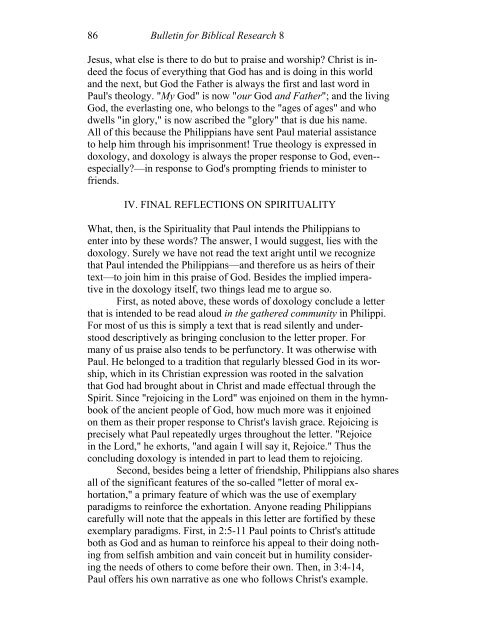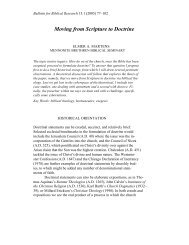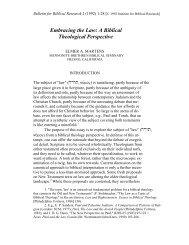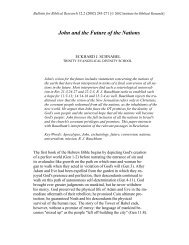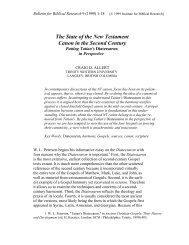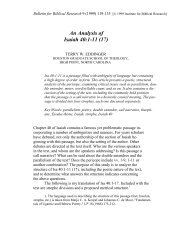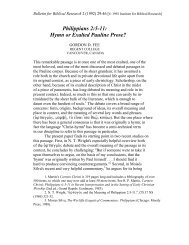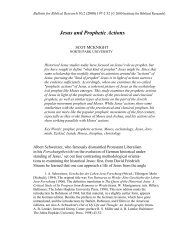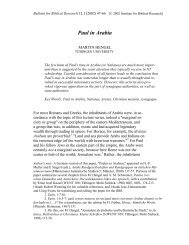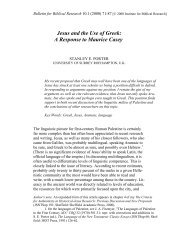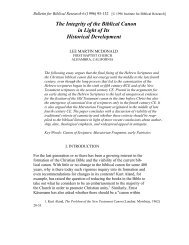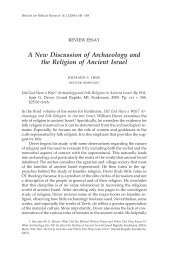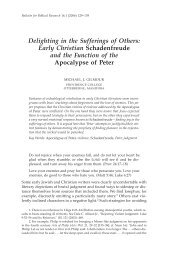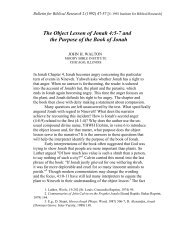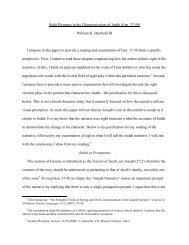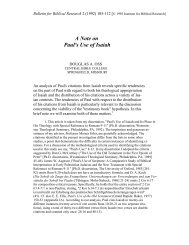Reflections on Exegesis and Spirituality in Philippians 4:10-20
Reflections on Exegesis and Spirituality in Philippians 4:10-20
Reflections on Exegesis and Spirituality in Philippians 4:10-20
You also want an ePaper? Increase the reach of your titles
YUMPU automatically turns print PDFs into web optimized ePapers that Google loves.
86 Bullet<strong>in</strong> for Biblical Research 8<br />
Jesus, what else is there to do but to praise <strong>and</strong> worship? Christ is <strong>in</strong>deed<br />
the focus of everyth<strong>in</strong>g that God has <strong>and</strong> is do<strong>in</strong>g <strong>in</strong> this world<br />
<strong>and</strong> the next, but God the Father is always the first <strong>and</strong> last word <strong>in</strong><br />
Paul's theology. "My God" is now "our God <strong>and</strong> Father"; <strong>and</strong> the liv<strong>in</strong>g<br />
God, the everlast<strong>in</strong>g <strong>on</strong>e, who bel<strong>on</strong>gs to the "ages of ages" <strong>and</strong> who<br />
dwells "<strong>in</strong> glory," is now ascribed the "glory" that is due his name.<br />
All of this because the <strong>Philippians</strong> have sent Paul material assistance<br />
to help him through his impris<strong>on</strong>ment! True theology is expressed <strong>in</strong><br />
doxology, <strong>and</strong> doxology is always the proper resp<strong>on</strong>se to God, even--<br />
especially?—<strong>in</strong> resp<strong>on</strong>se to God's prompt<strong>in</strong>g friends to m<strong>in</strong>ister to<br />
friends.<br />
IV. FINAL REFLECTIONS ON SPIRITUALITY<br />
What, then, is the <strong>Spirituality</strong> that Paul <strong>in</strong>tends the <strong>Philippians</strong> to<br />
enter <strong>in</strong>to by these words? The answer, I would suggest, lies with the<br />
doxology. Surely we have not read the text aright until we recognize<br />
that Paul <strong>in</strong>tended the <strong>Philippians</strong>—<strong>and</strong> therefore us as heirs of their<br />
text—to jo<strong>in</strong> him <strong>in</strong> this praise of God. Besides the implied imperative<br />
<strong>in</strong> the doxology itself, two th<strong>in</strong>gs lead me to argue so.<br />
First, as noted above, these words of doxology c<strong>on</strong>clude a letter<br />
that is <strong>in</strong>tended to be read aloud <strong>in</strong> the gathered community <strong>in</strong> Philippi.<br />
For most of us this is simply a text that is read silently <strong>and</strong> understood<br />
descriptively as br<strong>in</strong>g<strong>in</strong>g c<strong>on</strong>clusi<strong>on</strong> to the letter proper. For<br />
many of us praise also tends to be perfunctory. It was otherwise with<br />
Paul. He bel<strong>on</strong>ged to a traditi<strong>on</strong> that regularly blessed God <strong>in</strong> its worship,<br />
which <strong>in</strong> its Christian expressi<strong>on</strong> was rooted <strong>in</strong> the salvati<strong>on</strong><br />
that God had brought about <strong>in</strong> Christ <strong>and</strong> made effectual through the<br />
Spirit. S<strong>in</strong>ce "rejoic<strong>in</strong>g <strong>in</strong> the Lord" was enjo<strong>in</strong>ed <strong>on</strong> them <strong>in</strong> the hymnbook<br />
of the ancient people of God, how much more was it enjo<strong>in</strong>ed<br />
<strong>on</strong> them as their proper resp<strong>on</strong>se to Christ's lavish grace. Rejoic<strong>in</strong>g is<br />
precisely what Paul repeatedly urges throughout the letter. "Rejoice<br />
<strong>in</strong> the Lord," he exhorts, "<strong>and</strong> aga<strong>in</strong> I will say it, Rejoice." Thus the<br />
c<strong>on</strong>clud<strong>in</strong>g doxology is <strong>in</strong>tended <strong>in</strong> part to lead them to rejoic<strong>in</strong>g.<br />
Sec<strong>on</strong>d, besides be<strong>in</strong>g a letter of friendship, <strong>Philippians</strong> also shares<br />
all of the significant features of the so-called "letter of moral exhortati<strong>on</strong>,"<br />
a primary feature of which was the use of exemplary<br />
paradigms to re<strong>in</strong>force the exhortati<strong>on</strong>. Any<strong>on</strong>e read<strong>in</strong>g <strong>Philippians</strong><br />
carefully will note that the appeals <strong>in</strong> this letter are fortified by these<br />
exemplary paradigms. First, <strong>in</strong> 2:5-11 Paul po<strong>in</strong>ts to Christ's attitude<br />
both as God <strong>and</strong> as human to re<strong>in</strong>force his appeal to their do<strong>in</strong>g noth<strong>in</strong>g<br />
from selfish ambiti<strong>on</strong> <strong>and</strong> va<strong>in</strong> c<strong>on</strong>ceit but <strong>in</strong> humility c<strong>on</strong>sider<strong>in</strong>g<br />
the needs of others to come before their own. Then, <strong>in</strong> 3:4-14,<br />
Paul offers his own narrative as <strong>on</strong>e who follows Christ's example.


